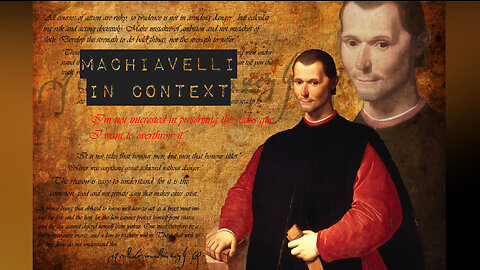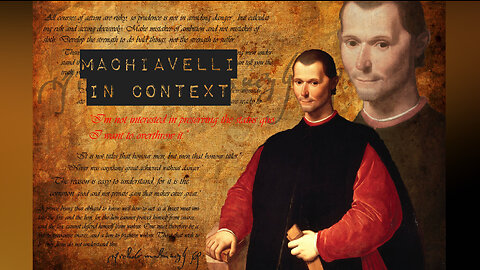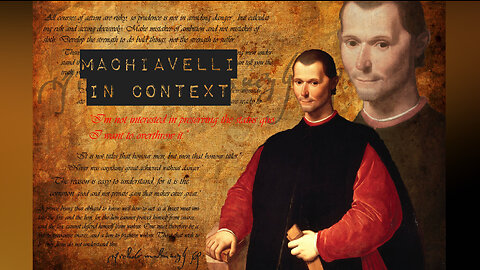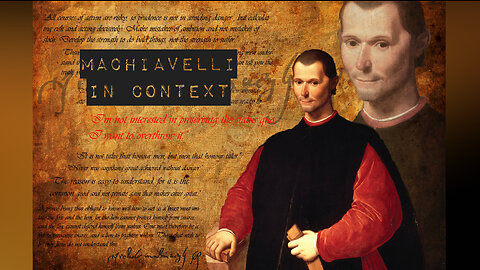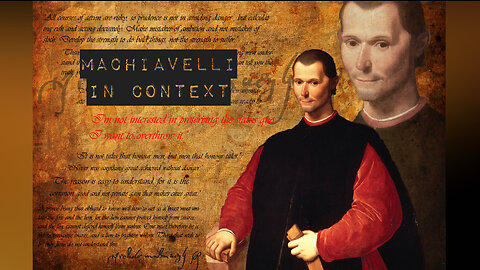
Machiavelli in Context
24 videos
Updated 6 months ago
24 lectures, 30 minutes/lecture
Taught by William R. Cook
State University of New York at Geneseo
Ph.D., Cornell University
-
Machiavelli in Context | Who Is Machiavelli? Why Does He Matter? (Lecture 1)
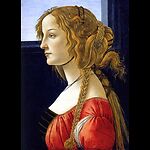 Adaneth - History&Politics24 lectures, 30 minutes/lecture Taught by William R. Cook State University of New York at Geneseo Ph.D., Cornell University Mentioning the name Niccolò Machiavelli can unleash a powerful response, even among people who have never read a word of his writings. Our language even has a word—Machiavellian—that encapsulates the images those responses conjure up: - An indistinct figure quietly making his way through the darkest corridors of power, hatching plots to play one rival against another - A cold-blooded political liar, ready to justify any duplicity undertaken in the name of a noble end that will ultimately justify the most malignant means - A coolly practical leader—amoral at best—willing to do whatever is necessary in a world governed not by ideas of right or wrong, but by solutions dictated by realpolitik. - But does the Machiavelli most of us think we know bear any resemblance to the Machiavelli who lived, pondered, and wrote? According to Professor William R. Cook, a reading of Machiavelli that considers only those qualities that we today call "Machiavellian" is incomplete, and Machiavelli himself "certainly would not recognize" such sinister interpretations or caricatures of his writings and beliefs. Indeed, The Prince—on the pages of which so much of this image was built—was not even published in his lifetime. In the 24 lectures that make up Machiavelli in Context, Professor Cook offers the opportunity to meet an extraordinarily thoughtful and sincere student of history and its lessons, and to learn that there is far more to him than can be gleaned from any reading of The Prince, no matter how thorough. Although The Prince is the work by which most of us think we know Machiavelli, and although some have indeed called it the first and most important book of political science ever written, it was not, according to Professor Cook, either Machiavelli's most important work or the one most representative of his beliefs. Those distinctions belong, instead, to his Discourses on the First Ten Books of Livy, a longer work started at about the same time and which would, like The Prince, not be published until well after his death. "Everyone who has seriously studied the works of Machiavelli agrees that he believed in the superiority of a republican form of government, defined as a mixed constitution with elements of monarchy, aristocracy, and democracy. "Once we recover the context of the writing of The Prince, and analyze it along with the Discourses on the First Ten Books of Livy, it will be clear how The Prince can be read as a book designed to guide leaders in the creation—for Machiavelli, restoration—of republican government in Italy. To present a complete and well-rounded picture of Machiavelli's ideas on how human societies should be organized and governed, Professor Cook sets aside much of Machiavelli's written output—which included the political work The Art of War, a biography, many letters, and even some plays—to focus on The Prince, the Discourses, and, more briefly, his Florentine Histories. Lecture 1: In addressing the main concerns of the entire course, I will begin by approaching the lecture title questions in two ways. First, I will briefly place Machiavelli in the context of the history of Western political thought. Second, I will address the question of the “real” Machiavelli. Although many see Machiavelli as responsible for justifying tyrannical and underhanded rule, others regard him as one of the greatest and most important theorists to argue for the superiority of a republican government. I will also address Machiavelli’s modernity. He strikes most people as one of the founders of modern thought and has even been referred to as “the first modern man.” I will introduce this idea here, but to address it thoroughly, we will need to examine the world of Renaissance Italy, as well as Machiavelli’s writings. Recommended Readings: Maurizio Viroli, Machiavelli, chapter 5, pp. 148–174.273 views 1 comment
Adaneth - History&Politics24 lectures, 30 minutes/lecture Taught by William R. Cook State University of New York at Geneseo Ph.D., Cornell University Mentioning the name Niccolò Machiavelli can unleash a powerful response, even among people who have never read a word of his writings. Our language even has a word—Machiavellian—that encapsulates the images those responses conjure up: - An indistinct figure quietly making his way through the darkest corridors of power, hatching plots to play one rival against another - A cold-blooded political liar, ready to justify any duplicity undertaken in the name of a noble end that will ultimately justify the most malignant means - A coolly practical leader—amoral at best—willing to do whatever is necessary in a world governed not by ideas of right or wrong, but by solutions dictated by realpolitik. - But does the Machiavelli most of us think we know bear any resemblance to the Machiavelli who lived, pondered, and wrote? According to Professor William R. Cook, a reading of Machiavelli that considers only those qualities that we today call "Machiavellian" is incomplete, and Machiavelli himself "certainly would not recognize" such sinister interpretations or caricatures of his writings and beliefs. Indeed, The Prince—on the pages of which so much of this image was built—was not even published in his lifetime. In the 24 lectures that make up Machiavelli in Context, Professor Cook offers the opportunity to meet an extraordinarily thoughtful and sincere student of history and its lessons, and to learn that there is far more to him than can be gleaned from any reading of The Prince, no matter how thorough. Although The Prince is the work by which most of us think we know Machiavelli, and although some have indeed called it the first and most important book of political science ever written, it was not, according to Professor Cook, either Machiavelli's most important work or the one most representative of his beliefs. Those distinctions belong, instead, to his Discourses on the First Ten Books of Livy, a longer work started at about the same time and which would, like The Prince, not be published until well after his death. "Everyone who has seriously studied the works of Machiavelli agrees that he believed in the superiority of a republican form of government, defined as a mixed constitution with elements of monarchy, aristocracy, and democracy. "Once we recover the context of the writing of The Prince, and analyze it along with the Discourses on the First Ten Books of Livy, it will be clear how The Prince can be read as a book designed to guide leaders in the creation—for Machiavelli, restoration—of republican government in Italy. To present a complete and well-rounded picture of Machiavelli's ideas on how human societies should be organized and governed, Professor Cook sets aside much of Machiavelli's written output—which included the political work The Art of War, a biography, many letters, and even some plays—to focus on The Prince, the Discourses, and, more briefly, his Florentine Histories. Lecture 1: In addressing the main concerns of the entire course, I will begin by approaching the lecture title questions in two ways. First, I will briefly place Machiavelli in the context of the history of Western political thought. Second, I will address the question of the “real” Machiavelli. Although many see Machiavelli as responsible for justifying tyrannical and underhanded rule, others regard him as one of the greatest and most important theorists to argue for the superiority of a republican government. I will also address Machiavelli’s modernity. He strikes most people as one of the founders of modern thought and has even been referred to as “the first modern man.” I will introduce this idea here, but to address it thoroughly, we will need to examine the world of Renaissance Italy, as well as Machiavelli’s writings. Recommended Readings: Maurizio Viroli, Machiavelli, chapter 5, pp. 148–174.273 views 1 comment -
Machiavelli in Context | Machiavelli’s Florence (Lecture 2)
 Adaneth - History&PoliticsLecture 2: When people stroll around Florence even a bit, they are introduced to such Florentines as Brunelleschi, Donatello, and the Medici. Stepping into the church of Santa Croce, they see the tombs of Michelangelo, Dante (actually he is not in that tomb), Galileo, and Machiavelli. It is impossible not to be overwhelmed by the great Florentine geniuses who shaped Western thought. What sort of place was Florence in the period we call the Renaissance? It was an oligarchical republic, and for much of the period after 1434, it was dominated by one family—the Medici. Florence was also a prosperous city, famous for its cloth and banking industries. It was an independent “nation” and, therefore, was constantly trying to gain advantage over its Italian neighbors, as well as deal with the great European monarchies. Recommended Readings: Articles by Nicolai Rubenstein, Elena Fasan Guarini, and Giovanni Silvano, in Machiavelli and Republicanism, Gisela Bock, Quentin Skinner, and Maurizio Viroli, et al., eds., pp. 3–70.230 views
Adaneth - History&PoliticsLecture 2: When people stroll around Florence even a bit, they are introduced to such Florentines as Brunelleschi, Donatello, and the Medici. Stepping into the church of Santa Croce, they see the tombs of Michelangelo, Dante (actually he is not in that tomb), Galileo, and Machiavelli. It is impossible not to be overwhelmed by the great Florentine geniuses who shaped Western thought. What sort of place was Florence in the period we call the Renaissance? It was an oligarchical republic, and for much of the period after 1434, it was dominated by one family—the Medici. Florence was also a prosperous city, famous for its cloth and banking industries. It was an independent “nation” and, therefore, was constantly trying to gain advantage over its Italian neighbors, as well as deal with the great European monarchies. Recommended Readings: Articles by Nicolai Rubenstein, Elena Fasan Guarini, and Giovanni Silvano, in Machiavelli and Republicanism, Gisela Bock, Quentin Skinner, and Maurizio Viroli, et al., eds., pp. 3–70.230 views -
Machiavelli in Context | Classical Thought in Renaissance Florence (Lecture 3)
 Adaneth - History&PoliticsLecture 3: The word Humanism often accompanies the term Renaissance, and to understand Machiavelli, we will have to know what this cultural revival and educational program consisted of. From the very word Renaissance, we conclude that there was a rebirth of the ancient classics. Although much of the treasury of Greek literature was rediscovered during the Renaissance, the Latin classics had been read and used throughout the Middle Ages. It is these Latin works, especially the writings of the historian Livy, that Machiavelli was primarily attracted to. I will argue that the Renaissance can best be understood as an educational movement that approached and found value in the classics in new ways. Thus, Machiavelli cannot be fully understood without a knowledge of the principal tenets of Renaissance Humanist thought and practice. Recommended Readings: Lauro Martines, Power and Imagination, chapter 11, pp. 191–217.194 views
Adaneth - History&PoliticsLecture 3: The word Humanism often accompanies the term Renaissance, and to understand Machiavelli, we will have to know what this cultural revival and educational program consisted of. From the very word Renaissance, we conclude that there was a rebirth of the ancient classics. Although much of the treasury of Greek literature was rediscovered during the Renaissance, the Latin classics had been read and used throughout the Middle Ages. It is these Latin works, especially the writings of the historian Livy, that Machiavelli was primarily attracted to. I will argue that the Renaissance can best be understood as an educational movement that approached and found value in the classics in new ways. Thus, Machiavelli cannot be fully understood without a knowledge of the principal tenets of Renaissance Humanist thought and practice. Recommended Readings: Lauro Martines, Power and Imagination, chapter 11, pp. 191–217.194 views -
Machiavelli in Context | The Life of Niccolò Machiavelli (Lecture 4)
 Adaneth - History&PoliticsLecture 4: Machiavelli was born the year that Lorenzo de’Medici became the leader of Florence (1469) and died the year the Medici were exiled from Florence for the second time (1527). In the republican interlude between the Medici domination (1494–1512), Machiavelli led an active life as a part of Florence’s government. His most important writings were produced in the years after the Medici reestablished their rulership of Florence. However, in this lecture we shall be concerned with more than Machiavelli’s career. I will present what we know about Machiavelli the man and why these personal elements are important when we analyze Machiavelli the thinker. Maybe we can come to some conclusion about why, in the most well-known portrait of Machiavelli, he has a smile as mysterious—though not as alluring—as another Florentine, Mona Lisa. Recommended Readings: Quentin Skinner, Machiavelli: A Very Short Introduction. Maurizio Viroli, Niccolò’s Smile: A Biography of Machiavelli.212 views
Adaneth - History&PoliticsLecture 4: Machiavelli was born the year that Lorenzo de’Medici became the leader of Florence (1469) and died the year the Medici were exiled from Florence for the second time (1527). In the republican interlude between the Medici domination (1494–1512), Machiavelli led an active life as a part of Florence’s government. His most important writings were produced in the years after the Medici reestablished their rulership of Florence. However, in this lecture we shall be concerned with more than Machiavelli’s career. I will present what we know about Machiavelli the man and why these personal elements are important when we analyze Machiavelli the thinker. Maybe we can come to some conclusion about why, in the most well-known portrait of Machiavelli, he has a smile as mysterious—though not as alluring—as another Florentine, Mona Lisa. Recommended Readings: Quentin Skinner, Machiavelli: A Very Short Introduction. Maurizio Viroli, Niccolò’s Smile: A Biography of Machiavelli.212 views -
Machiavelli in Context | Why Did Machiavelli Write The Prince? (Lecture 5)
 Adaneth - History&PoliticsLecture 5: We know a great deal about the circumstances in which Machiavelli wrote what has become his most famous work, The Prince. Although much of that knowledge comes from The Prince itself, we also have letters that Machiavelli wrote from his country estate, where he composed that powerful little book. In studying The Prince, we also come to realize that, although Machiavelli owes a great deal to classical writers from whom he borrowed examples and ideas, he is quite original in his thoughts and theories, disagreeing with both Aristotle and Cicero. Recommended Readings: Maurizio Viroli, “Introduction,” in Machiavelli’s The Prince, translated by Peter Bondanella, pp. vii–xxxix.196 views
Adaneth - History&PoliticsLecture 5: We know a great deal about the circumstances in which Machiavelli wrote what has become his most famous work, The Prince. Although much of that knowledge comes from The Prince itself, we also have letters that Machiavelli wrote from his country estate, where he composed that powerful little book. In studying The Prince, we also come to realize that, although Machiavelli owes a great deal to classical writers from whom he borrowed examples and ideas, he is quite original in his thoughts and theories, disagreeing with both Aristotle and Cicero. Recommended Readings: Maurizio Viroli, “Introduction,” in Machiavelli’s The Prince, translated by Peter Bondanella, pp. vii–xxxix.196 views -
Machiavelli in Context | The Prince, 1–5: Republics Old and New (Lecture 6)
 Adaneth - History&PoliticsLecture 6: If we are going to understand The Prince, we need to take seriously its author’s words. Hence, in this and the following five lectures, we will be “text crawling.” First, we will need to consider the original and revised dedications of the book—both to members of the Medici family. We will also consider how this work can be seen as an attempt to win the favor of the Medici so that Machiavelli could return to Florence and be of service to his beloved city. The first few chapters are often passed over rather quickly, for they are something of a catalogue of types of principalities and ways that they acquire new territory. Chapter 4 is Machiavelli’s first extended use of examples from classical antiquity to illuminate his discussion. He also makes use of the examples of the Ottoman Empire and France in his own time. We will discuss this chapter both for Machiavelli’s appeal to the past and the focus of The Prince on the present. Recommended Readings: Machiavelli, The Prince, translated by Peter Bondanella, chapters 1–5.207 views
Adaneth - History&PoliticsLecture 6: If we are going to understand The Prince, we need to take seriously its author’s words. Hence, in this and the following five lectures, we will be “text crawling.” First, we will need to consider the original and revised dedications of the book—both to members of the Medici family. We will also consider how this work can be seen as an attempt to win the favor of the Medici so that Machiavelli could return to Florence and be of service to his beloved city. The first few chapters are often passed over rather quickly, for they are something of a catalogue of types of principalities and ways that they acquire new territory. Chapter 4 is Machiavelli’s first extended use of examples from classical antiquity to illuminate his discussion. He also makes use of the examples of the Ottoman Empire and France in his own time. We will discuss this chapter both for Machiavelli’s appeal to the past and the focus of The Prince on the present. Recommended Readings: Machiavelli, The Prince, translated by Peter Bondanella, chapters 1–5.207 views -
Machiavelli in Context | The Prince, 6–7: Virtù and Fortuna (Lecture 7)
 Adaneth - History&PoliticsLecture 7: We first look at two terms that Machiavelli uses often, virtù (“virtue”) and Fortuna (“fortune”) and what they mean when he uses them. We then approach chapter 6, which concerns new principalities conquered through the prince’s own skill. In it, Machiavelli will cite such diverse figures as Moses; Romulus, the legendary founder of Rome; Theseus, the legendary Athenian; and even Girolamo Savonarola, the Dominican friar who dominated Florentine politics immediately following the expulsion of the Medici in 1494. Chapter 7, which deals with territories acquired by fortune or by the arms of others, is one of the most famous in The Prince. Here, Machiavelli introduces his readers to Cesare Borgia, often referred to as Machiavelli’s hero or role model for a modern prince. Machiavelli, while an ambassador for the Florentine Republic, had met Borgia, and certainly he admired many of Borgia’s “Machiavellian” traits. Recommended Readings: Machiavelli, The Prince, translated by Peter Bondanella, chapters 6–7.182 views
Adaneth - History&PoliticsLecture 7: We first look at two terms that Machiavelli uses often, virtù (“virtue”) and Fortuna (“fortune”) and what they mean when he uses them. We then approach chapter 6, which concerns new principalities conquered through the prince’s own skill. In it, Machiavelli will cite such diverse figures as Moses; Romulus, the legendary founder of Rome; Theseus, the legendary Athenian; and even Girolamo Savonarola, the Dominican friar who dominated Florentine politics immediately following the expulsion of the Medici in 1494. Chapter 7, which deals with territories acquired by fortune or by the arms of others, is one of the most famous in The Prince. Here, Machiavelli introduces his readers to Cesare Borgia, often referred to as Machiavelli’s hero or role model for a modern prince. Machiavelli, while an ambassador for the Florentine Republic, had met Borgia, and certainly he admired many of Borgia’s “Machiavellian” traits. Recommended Readings: Machiavelli, The Prince, translated by Peter Bondanella, chapters 6–7.182 views -
Machiavelli in Context | The Prince, 8–12: The Prince and Power (Lecture 8)
 Adaneth - History&PoliticsLecture 8: Machiavelli’s ninth chapter of The Prince examines civil principalities, leading to a discussion of the prince’s relationship with the citizens he governs. Some might be surprised by Machiavelli’s claim that it is more important for a prince to have the people than to have the nobility on his side. In chapter 11, Machiavelli takes up the particularly Italian issue of ecclesiastical principalities. After all, the popes claimed direct temporal rule over a large part of central Italy. In this context, Machiavelli makes some interesting remarks about the relationship of the Church to contemporary politics. Machiavelli creates a brief catalogue of the types of soldiers that princes make use of and makes the claim that there can be no good laws without good armies. Hence, it is essential to have the right kind of army. Recommended Readings: Machiavelli, The Prince, translated by Peter Bondanella, chapters 8–12.224 views
Adaneth - History&PoliticsLecture 8: Machiavelli’s ninth chapter of The Prince examines civil principalities, leading to a discussion of the prince’s relationship with the citizens he governs. Some might be surprised by Machiavelli’s claim that it is more important for a prince to have the people than to have the nobility on his side. In chapter 11, Machiavelli takes up the particularly Italian issue of ecclesiastical principalities. After all, the popes claimed direct temporal rule over a large part of central Italy. In this context, Machiavelli makes some interesting remarks about the relationship of the Church to contemporary politics. Machiavelli creates a brief catalogue of the types of soldiers that princes make use of and makes the claim that there can be no good laws without good armies. Hence, it is essential to have the right kind of army. Recommended Readings: Machiavelli, The Prince, translated by Peter Bondanella, chapters 8–12.224 views -
Machiavelli in Context | The Prince, 13–16: The Art of Being a Prince (Lecture 9)
 Adaneth - History&PoliticsLecture 9: Chapter 13 contains Machiavelli’s denunciation of the common practice of his day for Italian city-states to rely on auxiliary soldiers. In his discussion in the following chapter of how a prince prepares himself for war, Machiavelli stresses practical exercises of both mind and body and the necessity of studying history. Machiavelli also lays out part of what is new in his political thought by pointing out that human weakness lessens the value of those in the past who have written of ideal, imaginary republics. Such works will not get a prince very far, for often he must act in less-than-ideal ways in order to be an effective ruler. Machiavelli also contrasts having a particular virtuous quality, such as generosity, and appearing to have it. Which is more vital for a ruler? Recommended Readings: Machiavelli, The Prince, translated by Peter Bondanella, chapters 13–16.191 views
Adaneth - History&PoliticsLecture 9: Chapter 13 contains Machiavelli’s denunciation of the common practice of his day for Italian city-states to rely on auxiliary soldiers. In his discussion in the following chapter of how a prince prepares himself for war, Machiavelli stresses practical exercises of both mind and body and the necessity of studying history. Machiavelli also lays out part of what is new in his political thought by pointing out that human weakness lessens the value of those in the past who have written of ideal, imaginary republics. Such works will not get a prince very far, for often he must act in less-than-ideal ways in order to be an effective ruler. Machiavelli also contrasts having a particular virtuous quality, such as generosity, and appearing to have it. Which is more vital for a ruler? Recommended Readings: Machiavelli, The Prince, translated by Peter Bondanella, chapters 13–16.191 views -
Machiavelli in Context | The Prince, 17–21: The Lion and the Fox (Lecture 10)
 Adaneth - History&PoliticsLecture 10: Should a prince be loved or feared if indeed he cannot be both? Traditional thinkers would have chosen the former, while Machiavelli argues that the right answer is the latter. Similarly, Machiavelli asks if it is necessary or wise for a prince always to keep his word. In chapter 19, the longest of The Prince, Machiavelli draws on an extraordinary range of historical and modern examples in exploring how princes can avoid being hated. In doing so, he offers subtle lessons about how a prince today should use the past without imitating it literally. The lesson Machiavelli teaches here has applications for anyone who wants to learn from, but not be beholden to, the past. Recommended Readings: Machiavelli, The Prince, translated by Peter Bondanella, chapters 17–21.202 views
Adaneth - History&PoliticsLecture 10: Should a prince be loved or feared if indeed he cannot be both? Traditional thinkers would have chosen the former, while Machiavelli argues that the right answer is the latter. Similarly, Machiavelli asks if it is necessary or wise for a prince always to keep his word. In chapter 19, the longest of The Prince, Machiavelli draws on an extraordinary range of historical and modern examples in exploring how princes can avoid being hated. In doing so, he offers subtle lessons about how a prince today should use the past without imitating it literally. The lesson Machiavelli teaches here has applications for anyone who wants to learn from, but not be beholden to, the past. Recommended Readings: Machiavelli, The Prince, translated by Peter Bondanella, chapters 17–21.202 views

